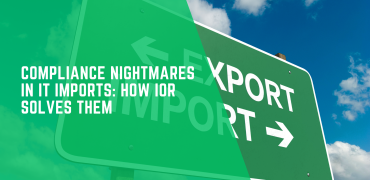If you lack knowledge about the intricate customs regulations and documentation required for importing goods globally, you may encounter various difficulties along the way. It is crucial to comprehend the meanings of the three primary roles associated with an import transaction and their distinctions. These roles are the importer of record (also known as the “declarant”), the exporter, and the consignee.
What is Importer of record service?
An importer of record (IOR) can be defined as an individual or entity that bears the responsibility of complying with the laws and regulations of the importing country when bringing legal goods into that country. This involves fulfilling legal obligations such as filing necessary documentation and paying any import duties and taxes that are applicable to the imported goods
Criteria for Importer of Record
The criteria for who qualifies as the Importer of Record can vary among nations. In numerous instances, the consignee (i.e., the individual who possesses the goods at the time of import) can fulfill this role.
However, in more complex transactions, it may be necessary to designate an agent, broker, or another legal entity in the destination country as the Importer of Record on the consignee’s behalf.
Designating an Importer of Record can prevent any ambiguity about who owns the goods during a transaction involving suppliers, distributors, and end-users. The IOR takes temporary possession of the goods until they are received by a distribution center, or the end-user takes delivery of them.
Definition and Role of the exporter
The exporter is the individual or organization that is authorized by customs and government agencies to transport goods from one country to another. The exporter may or may not be the actual seller of the goods and could instead be an entity acting on their behalf.
Definition and Role of the consignee
The consignee is the recipient of the shipment and is typically the owner of the goods. Once the goods are cleared by customs, the consignee assumes ownership of them. In a simple import/export transaction, the consignee usually bears the responsibility of paying import duties and taxes.
The consignee can be either a private individual consumer who orders goods from an overseas business or another company.
If a company imports its own goods, whether for internal use, storage, or distribution at a later stage, it is both the importer and the consignee.
Responsibilities related to Documentation for the Importer of Record (IOR)
The responsibilities of an importer of record (IOR) with regard to documentation include managing all the necessary supporting documents for the import. This may involve obtaining and handling import and export licenses, permits, and any required local paperwork related to rules and regulations. Additionally, the IOR is generally responsible for completing the required paperwork and forms related to the payment of duties, taxes, tariffs, and fees.
Customs and Compliance
To ensure adherence to all relevant rules, regulations, and laws of the importing country, the importer of record must maintain compliance. Any IOR service is liable to undergo compliance inspections of imports, audits of documentation, and attain necessary certification. Additionally, certain government agencies possess the power to prohibit the entry of specific imports. For instance, the Food and Drug Administration (FDA) can block the import of goods deemed a potential threat to the overall welfare of the United States. Importer of Record Service providers obtain all the required documentation that can ensure the smooth trade of your goods across borders.
IOR VS EOR
The exporter of record (EOR) shares similar responsibilities to those of an importer of record (IOR), but pertains to exports rather than imports. The EOR bears the responsibility for overseeing all aspects of the export process, starting from the country of origin of the product. An exporter is an individual or entity that has been granted authorization by the customs and government agencies to export goods from one country to another. It’s important to note that the exporter may not necessarily be the actual seller of the goods, but rather an intermediary entity acting on their behalf.
High Value Products
For customs purposes, any high-value import typically necessitates a registered local business or entity to serve as the importer of record. As an illustration, when acquiring high-value technology products, it is generally faster and more cost-effective to import them from a well known provider rather than dealing with technology distributors located worldwide. Collaborating with an IOR service provider enables import into hundreds of countries across the globe through a single point of contact, thus mitigating the risks and costs related to high-value goods.
How ASL can be your Importer of record in more than 200+ countries
ASL, along with IOR service, offers supplementary advantages when acting as your importer of record. These may encompass end-to-end logistics management, optimization of duties and taxes to determine the appropriate classification, support with trading entities, and other related services. For more details get in touch with our IOR specialist now.



